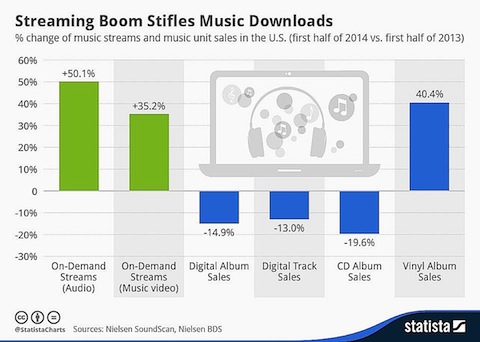
Dick Rowe blew it. Blew it big-time. Blew it worse than you and I ever blew anything.
Dick Rowe could have signed the Beatles to their first recording contract. The opportunity was served to him on a platter, or more precisely, a demo tape. He turned it down.
In early 1962, Dick met with Brian Epstein, the Beatles’ young manager. According to Brian’s account in his book, A Cellarful of Noise, Dick told him:
Not to mince words, Mr. Epstein, we don’t like your boys’ sound. Groups of four guitarists are on the way out.
Dick (or a colleague) went on, says Brian:
The boys won’t go, Mr. Epstein. We know these things. You have a good record business in Liverpool. Stick to that.
At least the bandleader who told Elvis to stick to driving a truck apparently did not add, “We know these things.”
Dick Rowe, now deceased, disputed the quotes. Maybe he did not exactly say, “Groups of four guitarists are on the way out,” since nobody accused him of being unable to count. But whatever he said, Dick Rowe had the Beatles within his reach and he let them slip away.
In Dick’s defense, the demo tapes were not very good. But the sound you hear in the Beatles’ demo version of the early Motown hit, Money (That’s What I Want), is the sound of rock & roll getting revitalized. Even if John’s vocal is way over the top.
Also in his defense, Dick Rowe worked for British Decca (distributed in the US by London Records). Their star was Mantovani, Britain’s best selling recording artist, whose cascading strings were hardly on the same planet with the Beatles. In a sense, Dick Rowe did “know these things.” And he stuck with what he knew.
The Streaming Music Revolution
As it looks at listening trends in mid-2014, the music world sees: On-demand streaming music UP. Vinyl album sales UP. Digital download sales DOWN. CD sales DOWN. Nice chart, Statista.
The Streaming Music Revolution is today’s Beatlemania. Like guitar groups in the 60’s, streaming music is where it’s at. You would expect today’s music industry to face the music, but the industry still has its Dick Rowes.
Rocco Pendala of Rocco Riffs, who minces even less words than Dick Rowe, says, “The Stupidity of the Music Industry Is Absolutely Stunning“.
Pendola asks:
Why would an industry effectively cede control over its product to technology companies and financial firms with different and, quite often, competing goals? It didn’t make sense as Pandora was emerging. It makes even less sense now. It’s truly nothing short of stunning that the record labels sit back and watch Pandora make better use of data derived from music (to sell advertising) than the labels themselves.
Is the music world letting streaming music slip away? Are recording artists and labels ceding control “to technology companies and financial firms?” Is it too late?
It’s never too late. The story of music is full of second chances.
Dick Rowe’s Second Chance
Let’s get back to the hapless Dick Rowe. It turns out he was not so hapless.
In 1963, Dick Rowe got his second chance. He was introduced to a guitar group even louder, even scruffier, than the Beatles, another group hardly on the same planet with Mantovani.
Dick Rowe learned his lesson. This time, he signed the group. That’s how the Rolling Stones ended up not only on the same planet with Mantovani but also on the same record label.
It’s time for today’s music industry to find its Rolling Stones.


Dick Rowe didn’t turn down the Beatles. It was Decca recording manager Mike Smith who recorded the Beatles. As he was new to the A&R department his boss said since he didn’t have much experience, he could sign up on of the two groups he recorded on New Years Day. Smith turned down the Beatles and signed Brian Poole & the Tremeloes. Dick Rowe never said those words quoted in Brian’s book. Brian made them up and Dick Rowe always stated that he never said them. It was Parlophone which was the company not used to rock groups, they mainly recorded classical and comedy records. Rowe signed up the Rolling Stones. Them. The Moody Blues, the Zombies, John Mayall’s Bluesbreakers. The Animals, Tom Jones, the Small Faces, Marmalade, Cat Sevens and Procol Harum and produced numerous chart-topping records.
Bill, thank you for your comment. I have heard that Mike Smith wanted both groups and Dick Rowe said no, offering as consolation the Tony Meehan self-financed production deal that Brian Epstein rightly turned down, but I will defer to your knowledge of these matters. According to your interesting web site (http://triumphpc.com/mersey-beat), you are “the author of thirteen books on the Beatles,” which is thirteen more than I have written. Thank you for finding my eight year old post.